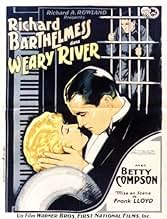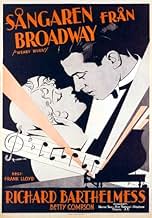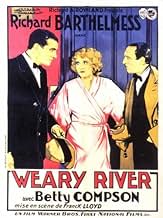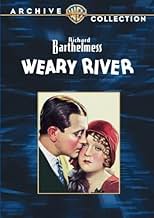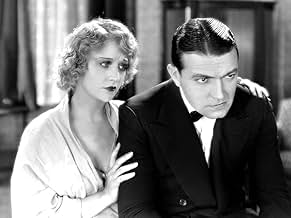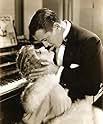Añade un argumento en tu idiomaA gangster is put in prison, but finds salvation through music while serving his time. Again on the outside, he finds success elusive and temptations abound.A gangster is put in prison, but finds salvation through music while serving his time. Again on the outside, he finds success elusive and temptations abound.A gangster is put in prison, but finds salvation through music while serving his time. Again on the outside, he finds success elusive and temptations abound.
- Dirección
- Guión
- Reparto principal
- Nominado para 1 premio Óscar
- 2 premios y 1 nominación en total
George E. Stone
- Blackie
- (as George Stone)
Ray Turner
- Elevator Boy
- (as Raymond Turner)
Ernie Adams
- Ex-Con in Alley
- (sin acreditar)
Brooks Benedict
- Jerry's Guest
- (sin acreditar)
Ruth Cherrington
- Actress Backstage Who Locks Her Door
- (sin acreditar)
James Conaty
- Attorney at Trial
- (sin acreditar)
Richard Cramer
- Prison Radio Announcer
- (sin acreditar)
Oliver Cross
- Restaurant Patron
- (sin acreditar)
Edwards Davis
- Prison Chaplain
- (sin acreditar)
Sally Eilers
- Hatcheck Girl
- (sin acreditar)
Jim Farley
- Plainclothesman with Sergeant
- (sin acreditar)
Sherry Hall
- Prison Phone Operator
- (sin acreditar)
Chuck Hamilton
- Prison Photographer
- (sin acreditar)
Reseñas destacadas
Frank Lloyd was Oscar nominated for this film & two others, in 1929, about a gangster imprisoned, who becomes a singer...singing endlessly throughout the film the title song.
It's part silent-part talkie...which makes me think that this had been originally shot as a silent and then some portions of it where re-shot with dialogue, a usual thing to be done back in 1929.
A rare chance to watch William Holden, the elderly character actor (no relation to the star of Sunset Boulevard) of late silents and early talkies, who's very, very fine as the warden of the prison, in which gangster Richard Barthelmess is locked up. Barthelmess is good as Jerry Larrabee and Betty Compson (although her voice sounds a little bit high-pitched-maybe due to technical shortcomings)is fine too, as her girlfriend.
Thanks again to TCM, for the opportunity of watching another "rarity", not seen for a long time (completely restored, as best as possible).
It's part silent-part talkie...which makes me think that this had been originally shot as a silent and then some portions of it where re-shot with dialogue, a usual thing to be done back in 1929.
A rare chance to watch William Holden, the elderly character actor (no relation to the star of Sunset Boulevard) of late silents and early talkies, who's very, very fine as the warden of the prison, in which gangster Richard Barthelmess is locked up. Barthelmess is good as Jerry Larrabee and Betty Compson (although her voice sounds a little bit high-pitched-maybe due to technical shortcomings)is fine too, as her girlfriend.
Thanks again to TCM, for the opportunity of watching another "rarity", not seen for a long time (completely restored, as best as possible).
WEARY RIVER (First National Pictures, 1929), a Richard A. Rowland Presentation directed by Frank Lloyd, stars Richard Barthelmess, a popular leading of the silent screen, in this part-silent/part talking 90 minute production produced during the dawn of sound (1927-1929). Regardless of its name, WEARY RIVER is actually a title tune that bears no reference to a river that's weary. While Barthelmess shows great promise that would soon lead to his future in talkies, his singing would not become his forte, considering the fact that his vocalization was reportedly dubbed by another. Basically a crime-melodrama with mix of prison theme and music, WEARY RIVER is quite an entertaining product made entertaining most through its silent orchestral underscoring credited by musical director, Louis Silvers.
Based on the story by Courtney Ryler-Cooper, the plot introduces Jerry Larrabee (Richard Barthelmess), a well-known bootlegger, escorting his steady girlfriend, Alice Gray (Betty Compson) to the Literary Club (for Members only). He soon leaves Alice following a phone call to attend to business regarding Spadoni (Louis Natheaux), a rival gangster gunning for his territory. With an innocent bystander killed during a rumble, Jerry is placed under arrest by his friend (Robert Emmett O'Connor), a police sergeant, accompanied by a detective (James Farley). Jerry stands trial where he is sentenced to serve one to ten years at Laboring Prison. Going under the number of 46039, Jerry becomes a rebellious prisoner until the kindly Warden (William Holden) gives him every chance to change his ways. For Jerry to become a better person, the Warden advises the visiting Alice not to see him again, with the belief that it would be better for Jerry to break all connections with his past. During the course of time, Jerry becomes a songwriter who forms a prison band, broadcasting his latest composition "Weary River," broadcast over the WDCB Radio station, to much success, becoming well known under his new title, "Master of Melody." Upon his prison release for good behavior, Jerry becomes a vaudeville singer vocalizing his signature, "Weary River." Because of his prison record, Jerry finds it difficult adjusting to his new life on the outside, especially with temptation of returning to his life of crime for avenging on the man who framed him. Others featured in the cast are George E. Stone ("Blackie"), Raymond Turner (The Elevator Boy); Gladden James (The Manager); Lee Moran (The Hoofer); and Ernie Adams.
Aside from the tune "Weary River" being vocalized four times and underscored numerously (including during closing exit music) enough for viewers to become song weary before the movie ends, the performance given by Barthelmess and Compson are well acted, even if considered old-style by contemporary viewers. Barthelmess also sings briefly "Frankie and Johnny" along with another tune titled "It's Up to You." Based on the plot summary of a convict becoming a radio singer through broadcast hook-up from the prison, one cannot help but think about a similar themed story of SAY IT WITH SONGS (1929) starring Al Jolson. Had Jolson starred in WEARY RIVER instead, with he singing more songs that the oft-repeated title tune, it would have benefitted his performing style here more than the poorly written and his badly acted performance that has often labeled SAY IT WITH SONGS, regardless of some potential, to be Jolson's worst movie. Interestingly, Frank Lloyd was nominated for an Academy Award for Best Director for this and two other productions, DRAG (with Barthelmess) and THE DIVINE LADY (winner). William Holden (not the famous actor in later years) is commendable as the sympathetic warden while shadowy images of guards leading convict to his execution is well done.
Reportedly WEARY RIVER went through a long and tedious process of restoration in recent years, a challenge that paid off. Unavailable for viewing in decades, and with part-talkies seldom given any sort of revivals since its original release, WEARY RIVER resurfaced intact on Turner Classic Movies (TCM premiere: August 24, 1997), and has become available on DVD for anyone interested in movies during its transformation from silent to sound. (***).
Based on the story by Courtney Ryler-Cooper, the plot introduces Jerry Larrabee (Richard Barthelmess), a well-known bootlegger, escorting his steady girlfriend, Alice Gray (Betty Compson) to the Literary Club (for Members only). He soon leaves Alice following a phone call to attend to business regarding Spadoni (Louis Natheaux), a rival gangster gunning for his territory. With an innocent bystander killed during a rumble, Jerry is placed under arrest by his friend (Robert Emmett O'Connor), a police sergeant, accompanied by a detective (James Farley). Jerry stands trial where he is sentenced to serve one to ten years at Laboring Prison. Going under the number of 46039, Jerry becomes a rebellious prisoner until the kindly Warden (William Holden) gives him every chance to change his ways. For Jerry to become a better person, the Warden advises the visiting Alice not to see him again, with the belief that it would be better for Jerry to break all connections with his past. During the course of time, Jerry becomes a songwriter who forms a prison band, broadcasting his latest composition "Weary River," broadcast over the WDCB Radio station, to much success, becoming well known under his new title, "Master of Melody." Upon his prison release for good behavior, Jerry becomes a vaudeville singer vocalizing his signature, "Weary River." Because of his prison record, Jerry finds it difficult adjusting to his new life on the outside, especially with temptation of returning to his life of crime for avenging on the man who framed him. Others featured in the cast are George E. Stone ("Blackie"), Raymond Turner (The Elevator Boy); Gladden James (The Manager); Lee Moran (The Hoofer); and Ernie Adams.
Aside from the tune "Weary River" being vocalized four times and underscored numerously (including during closing exit music) enough for viewers to become song weary before the movie ends, the performance given by Barthelmess and Compson are well acted, even if considered old-style by contemporary viewers. Barthelmess also sings briefly "Frankie and Johnny" along with another tune titled "It's Up to You." Based on the plot summary of a convict becoming a radio singer through broadcast hook-up from the prison, one cannot help but think about a similar themed story of SAY IT WITH SONGS (1929) starring Al Jolson. Had Jolson starred in WEARY RIVER instead, with he singing more songs that the oft-repeated title tune, it would have benefitted his performing style here more than the poorly written and his badly acted performance that has often labeled SAY IT WITH SONGS, regardless of some potential, to be Jolson's worst movie. Interestingly, Frank Lloyd was nominated for an Academy Award for Best Director for this and two other productions, DRAG (with Barthelmess) and THE DIVINE LADY (winner). William Holden (not the famous actor in later years) is commendable as the sympathetic warden while shadowy images of guards leading convict to his execution is well done.
Reportedly WEARY RIVER went through a long and tedious process of restoration in recent years, a challenge that paid off. Unavailable for viewing in decades, and with part-talkies seldom given any sort of revivals since its original release, WEARY RIVER resurfaced intact on Turner Classic Movies (TCM premiere: August 24, 1997), and has become available on DVD for anyone interested in movies during its transformation from silent to sound. (***).
The years 1928 to 1930 were perhaps the crappiest couple of years in movie history. This is the period during which films transitioned from silent to sound and the learning curve was steep for most. "Weary River" is one of the better transitional films, as it actually feels like a movie and not a sound stage-bound play.
This film is actually part silent and part sound, though the ratio is about 80/20 talking to silent. Richard Barthelmess and Betty Compson prove themselves to be decent talking actors, though neither went on to have substantial careers in the new medium. The material they're given is still of the melodramatic silent movie kind, so they can only do so much with it. But the film bucks some of the trends that make other early talkies such bores. For one, the camera actually moves, whereas most early talkies find the actors standing in one spot with a stationary camera planted squarely in the middle of the frame. Also, this film has nearly constant underscoring like a silent film would have, which reduces the amount of dead air that plagues many early sound films and causes them to have such stilted pacing. The silent/sound hybrid is weird to watch -- there's no narrative reason for some parts to have titles while others are spoken -- but it's like the fact that this film couldn't quite commit to being a complete talkie made it a better sound film than it would otherwise have been.
The title of the film comes from a song that Barthelmess's ex-con character makes famous and that launches his reformed life as a radio singer, a song which I hope you like because Barthelmess warbles it in its entirety for what feels like a dozen times.
"Weary River" was one of three films that brought Frank Lloyd a Best Director Oscar nomination in the 1928-29 award year, the other two being "The Divine Lady" and "Drag." This was a weird year for Oscar. Technically, there weren't any nominations; at the awards ceremony, only winners were announced in each category. I'm not sure how people knew to show up for the ceremony if they weren't officially nominated, but that's something to figure out some other day I guess. But historical documents have since suggested what films were being considered in each category, and "Weary River" was included in Best Director. Frank Lloyd did win, but he won only for "The Divine Lady," as it seems that, though an artist could be nominated for multiple films, the voters were able to show preference for what film actually went with the award.
A bit of trivia -- Lloyd was only the second and last person to win a Best Director Oscar for a film not also nominated for Best Picture (Lewis Milestone was the first, for "Two Arabian Knights" from the previous year, though the first Oscar ceremony included two Best Director awards, one for dramatic films and one for comedies, so it's no an exact comparison).
Grade: B-
This film is actually part silent and part sound, though the ratio is about 80/20 talking to silent. Richard Barthelmess and Betty Compson prove themselves to be decent talking actors, though neither went on to have substantial careers in the new medium. The material they're given is still of the melodramatic silent movie kind, so they can only do so much with it. But the film bucks some of the trends that make other early talkies such bores. For one, the camera actually moves, whereas most early talkies find the actors standing in one spot with a stationary camera planted squarely in the middle of the frame. Also, this film has nearly constant underscoring like a silent film would have, which reduces the amount of dead air that plagues many early sound films and causes them to have such stilted pacing. The silent/sound hybrid is weird to watch -- there's no narrative reason for some parts to have titles while others are spoken -- but it's like the fact that this film couldn't quite commit to being a complete talkie made it a better sound film than it would otherwise have been.
The title of the film comes from a song that Barthelmess's ex-con character makes famous and that launches his reformed life as a radio singer, a song which I hope you like because Barthelmess warbles it in its entirety for what feels like a dozen times.
"Weary River" was one of three films that brought Frank Lloyd a Best Director Oscar nomination in the 1928-29 award year, the other two being "The Divine Lady" and "Drag." This was a weird year for Oscar. Technically, there weren't any nominations; at the awards ceremony, only winners were announced in each category. I'm not sure how people knew to show up for the ceremony if they weren't officially nominated, but that's something to figure out some other day I guess. But historical documents have since suggested what films were being considered in each category, and "Weary River" was included in Best Director. Frank Lloyd did win, but he won only for "The Divine Lady," as it seems that, though an artist could be nominated for multiple films, the voters were able to show preference for what film actually went with the award.
A bit of trivia -- Lloyd was only the second and last person to win a Best Director Oscar for a film not also nominated for Best Picture (Lewis Milestone was the first, for "Two Arabian Knights" from the previous year, though the first Oscar ceremony included two Best Director awards, one for dramatic films and one for comedies, so it's no an exact comparison).
Grade: B-
10glofau
The plot of Weary River is a peculiar amalgam of gangster movie, love story and musical centering around a sensitive hood played by Richard Barthelmess who, after being sent to jail for a crime he didn't commit, discovers his true passion for music and becomes a radio star (based on a true story, believe it or not!). As an entertainment, I give this film 7 out of 10 stars. It's dated but well-paced and amusing without being particularly outstanding.
This review is about Weary River's soundtrack, which is an astonishing achievement for its time but overlooked by film music historians... possibly because the recordings were only rediscovered and restored to the film in 1997.
Film music historians often talk about Max Steiner's 1933 score for King Kong and Franz Waxman's 1934 score for The Bride of Frankenstein as if Steiner and Waxman magically invented synchronized music for film out of thin air... which is preposterous. Due to the success of The Jazz Singer, early talkies were mostly musicals. But it's one thing to have people burst into song in the middle of a scene as if they were on the stage, as in Ernst Lubitsch's superior 1929 film "The Love Parade"... it's something else entirely when the music has to synchronize with action and dialogue over the course of multiple shots and scenes, as in Weary River.
You see, in early talkies, all the sound had to be recorded live simultaneously. If you were going to have music under dialogue, or sound effects, or dialogue looping, it all had to be recorded at the same time. They didn't have multi-track recording in 1929.
Weary River has musical underscoring in virtually every shot of the picture. If you wanted underscoring in 1929, you had to have the orchestra and conductor on the set with the actors. But Weary River has music that flows from silent sequences into talking sequences. To allow that to happen, the composer had to write music for the entire film after they had shot the silent sequences and edited them together but BEFORE they had shot the sound sequences. The composer/conductor (Louis Silvers, who certainly deserved the big screen credit he got for his work) would then have to record all the music for the edited silent sequences. Where the silent and sound sequences were to join together, the conductor would have to record the music to a metronome beat; this would allow the yet-to-be-recorded sound sequence to join seamlessly with the silent sequence musically.
At some point in this process, the composer and director would have to collaborate in order to pre-plan the shot list for the sound sequences... because Weary River has a very sophisticated editing scheme for the visuals. There are a lot of different kinds of shot sequences leading into spoken dialogue. You don't just go from a silent sequence with musical score into a static shot with dialogue on a soundstage. There are many cuts, pieces of business, scene changes, sound effects or synchronized spoken words, all of which had to flow seamlessly into a spoken dialogue exchange in the film with unbroken music playing under it. That means a lot of planning, charts, diagrams. There is nothing spontaneous about the synchronized sound and music of Weary River. It's a choreographed dance of visuals and effects and music and dialogue, all recorded live on a soundstage with actors on a set waiting for their cue. Did they have the conductor in a soundproofed booth with glass windows containing a metronome so that the click didn't get onto the sound track? Did they run edited film behind the orchestra with punches flashing the tempo while the actors waited on the nearby set for their cue to speak? There was clearly one sequence I saw where an actress had to sit with the orchestra and deliver her line in time to her own actions on a film playback which then flowed into a sequence shot live on a set with other actors. This is not a typical early talkie. The fluidity of the shots, and the way the music synchronizes with them and works with the dialogue to create an integrated whole, all recorded in one pass... mind boggling. Things flow together so seamlessly that you don't even realize what you're looking at.
Compare Weary River with a 1929 film like The Vagabond Lover; its shots and music integration are simplistic, static, nothing more than 2 or 3 cameras pointing at a band playing and singing. 1929's The Broadway Melody is exactly the same, primitive camera positions and static shots and nothing very complicated.
Weary River, on the other hand, is a much more sophisticated production... to achieve that fluidity, that seamless integration of music and sound and imagery, required some really extreme measures on the part of the production team given their technical limitations. I'm surprised it's not more highly regarded. In terms of technical achievement, Weary River rates 10 stars.
Unfortunately, the music is not as memorable as King Kong or Bride of Frankenstein. But Weary River makes sound film look like silent film WITH a synchronized musical score and dialogue, which is an amazing feat. Director Frank Lloyd won the Oscar for best director that year, and he deserved it. In 1929, the team at Warner's was the best in the business when in came to sound films, and Weary River is a technical tour de force. You won't see anything more fluid with background music until 1932's groundbreaking Love Me Tonight.
This review is about Weary River's soundtrack, which is an astonishing achievement for its time but overlooked by film music historians... possibly because the recordings were only rediscovered and restored to the film in 1997.
Film music historians often talk about Max Steiner's 1933 score for King Kong and Franz Waxman's 1934 score for The Bride of Frankenstein as if Steiner and Waxman magically invented synchronized music for film out of thin air... which is preposterous. Due to the success of The Jazz Singer, early talkies were mostly musicals. But it's one thing to have people burst into song in the middle of a scene as if they were on the stage, as in Ernst Lubitsch's superior 1929 film "The Love Parade"... it's something else entirely when the music has to synchronize with action and dialogue over the course of multiple shots and scenes, as in Weary River.
You see, in early talkies, all the sound had to be recorded live simultaneously. If you were going to have music under dialogue, or sound effects, or dialogue looping, it all had to be recorded at the same time. They didn't have multi-track recording in 1929.
Weary River has musical underscoring in virtually every shot of the picture. If you wanted underscoring in 1929, you had to have the orchestra and conductor on the set with the actors. But Weary River has music that flows from silent sequences into talking sequences. To allow that to happen, the composer had to write music for the entire film after they had shot the silent sequences and edited them together but BEFORE they had shot the sound sequences. The composer/conductor (Louis Silvers, who certainly deserved the big screen credit he got for his work) would then have to record all the music for the edited silent sequences. Where the silent and sound sequences were to join together, the conductor would have to record the music to a metronome beat; this would allow the yet-to-be-recorded sound sequence to join seamlessly with the silent sequence musically.
At some point in this process, the composer and director would have to collaborate in order to pre-plan the shot list for the sound sequences... because Weary River has a very sophisticated editing scheme for the visuals. There are a lot of different kinds of shot sequences leading into spoken dialogue. You don't just go from a silent sequence with musical score into a static shot with dialogue on a soundstage. There are many cuts, pieces of business, scene changes, sound effects or synchronized spoken words, all of which had to flow seamlessly into a spoken dialogue exchange in the film with unbroken music playing under it. That means a lot of planning, charts, diagrams. There is nothing spontaneous about the synchronized sound and music of Weary River. It's a choreographed dance of visuals and effects and music and dialogue, all recorded live on a soundstage with actors on a set waiting for their cue. Did they have the conductor in a soundproofed booth with glass windows containing a metronome so that the click didn't get onto the sound track? Did they run edited film behind the orchestra with punches flashing the tempo while the actors waited on the nearby set for their cue to speak? There was clearly one sequence I saw where an actress had to sit with the orchestra and deliver her line in time to her own actions on a film playback which then flowed into a sequence shot live on a set with other actors. This is not a typical early talkie. The fluidity of the shots, and the way the music synchronizes with them and works with the dialogue to create an integrated whole, all recorded in one pass... mind boggling. Things flow together so seamlessly that you don't even realize what you're looking at.
Compare Weary River with a 1929 film like The Vagabond Lover; its shots and music integration are simplistic, static, nothing more than 2 or 3 cameras pointing at a band playing and singing. 1929's The Broadway Melody is exactly the same, primitive camera positions and static shots and nothing very complicated.
Weary River, on the other hand, is a much more sophisticated production... to achieve that fluidity, that seamless integration of music and sound and imagery, required some really extreme measures on the part of the production team given their technical limitations. I'm surprised it's not more highly regarded. In terms of technical achievement, Weary River rates 10 stars.
Unfortunately, the music is not as memorable as King Kong or Bride of Frankenstein. But Weary River makes sound film look like silent film WITH a synchronized musical score and dialogue, which is an amazing feat. Director Frank Lloyd won the Oscar for best director that year, and he deserved it. In 1929, the team at Warner's was the best in the business when in came to sound films, and Weary River is a technical tour de force. You won't see anything more fluid with background music until 1932's groundbreaking Love Me Tonight.
Turner Classic Movies presented "Weary River" in March of 2003 as part of its month of Oscar. I found it intriguing, even enjoyable. Partly because it was half-silent and half-sound, I was intrigued, since I have a deep and abiding interest in the earliest films. I enjoyed it for that reason, and because the story itself was, at the very least, pleasant, if not totally believable and realistic. Betty Compson, who played Alice, had a remarkably cute way of speaking, and whenever she called to her lover Jerry, played by Richard Barthelmess, she pronounced it "Jer-wy," which I found endearing. Great cinema? Perhaps not, but one I would like to see again, if only to prove to myself whether Barthelmess did his own singing. And to watch and hear the adorable Betty Compson.
¿Sabías que...?
- CuriosidadesThe film is part silent, with intertitles, and part sound, which was important to feature the main character's talent as a singer, although the title song Weary River was nevertheless dubbed by a professional singer. One scene near the end features an orchestra playing on-screen on set that is a radio studio, while traditional silent movie sound is substituted for real sound. Then the scene technology audibly changes to sound recorded on film, with the same orchestra appearing to play for real (possibly dubbed) as the main character begins to sing (although he is listed as dubbed) in a radio performance that prompts his sweetheart to call the radio studio. The scene is an unusual mix of technologies during a period of transition from silents to sound.
- PifiasWhen Jerry Larrabee is brought in to the prison bathroom, there is already an inmate having a bath, who has disappeared before the scene is over.
- Citas
Prison Warden: Oh, I know how you feel. But, things won't be half as bad if you'll only play ball with us.
- Versiones alternativasFirst National also released this film in a silent version.
- Banda sonoraWeary River
(1929)
Music by Louis Silvers
Lyrics by Grant Clarke
Sung by Richard Barthelmess (dubbed by Johnny Murray)
Selecciones populares
Inicia sesión para calificar y añadir a tu lista para recibir recomendaciones personalizadas
Detalles
- Fecha de lanzamiento
- País de origen
- Idioma
- Títulos en diferentes países
- Pesma robijaša
- Localizaciones del rodaje
- Empresa productora
- Ver más compañías en los créditos en IMDbPro
- Duración1 hora 26 minutos
- Color
- Relación de aspecto
- 1.33 : 1
Contribuir a esta página
Sugerir un cambio o añadir el contenido que falta

